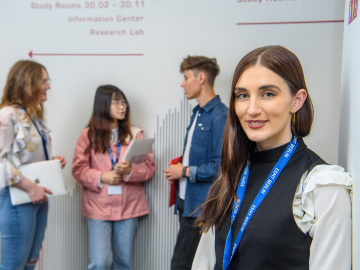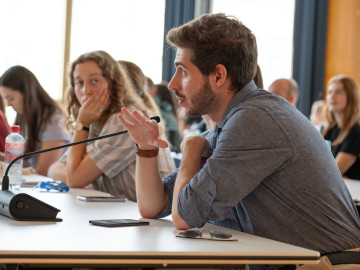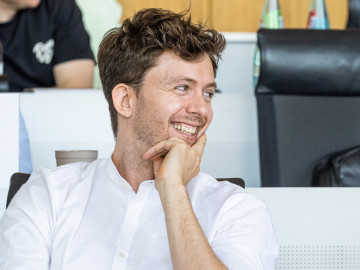On this page, you will find detailed information about our students’ backgrounds and opportunities to collaborate through internships and consulting projects.
The Master Community: MSc 2024-2026 & MSc 2025-2027
- Students currently enrolled: 294
- Unique nationalities: 48
- Gender split (F/M): 46/54%
- International students: 75%
Meet our MBA Students & Graduates: FTMBA, GOMBA, and PTMBA
Work with our Students: Mandatory Internships & Consulting Projects
MSc Internships & Consulting Projects
MSc Internships: Key Facts
The ESMT Master programs combine work in companies with high-quality coursework and research on the latest business management theories. As part of the curriculum, students are required to do an internship.
The internship provides students with an opportunity to apply what they have learned in their core courses and the knowledge gained from prior work experience in a corporate environment that is relevant for their future careers.
- Programs/Areas of specialization: Analytics and Artificial Intelligence, Innovation and Entrepreneurship, and Global Management
- Internship phase (MSc 2027): 01 April – 30 September 2026
- Latest date to start internship: July 2026
- Duration: 3-6 months
- A Mandatory Internship Confirmation is available to employers
- Employers are required to fill out a Company Feedback Survey after the internship, to reflect on their collaboration with MSc interns.
Internship FAQ for Companies
Who benefits?
While the internship is conducted by the student as an obligatory part of the academic curriculum, it is carried out with the additional purpose of delivering benefits to the companies. The working areas should therefore be defined in collaboration with the student to ensure relevance and appropriate scope.
How much should be paid?
Although companies are legally not obliged to pay minimum wage for mandatory internships, MSc students expect a compensation that reflects their qualifications and contributions to the company. The increasing cost of living also plays a role in their internship choices. The usual salary range for MSc internships in Germany is EUR 900–3,000 gross/month, varying according to company and industry.
For internships outside of Berlin, some employers also cover travel costs and support with the search for accommodation. ESMT does not receive compensation from internship host organizations and does not cover any of the students’ expenses.
Is there a contract between the student and the company?
Yes, every internship requires a contractual relationship between the student and the company, following the company’s practice. Issues of confidentiality may be governed in the form of a non-disclosure agreement to be signed by the student.
What are the company’s obligations during the project?
Organizations must provide the student with general support, including giving him/her work tasks that fit their profile and that give them the chance to learn and apply knowledge.
How long should the internship be?
Internships should typically be a minimum of 12 weeks and a maximum of 26 weeks long. Students are strongly encouraged to do significantly more than sixteen weeks.
What should interns be doing?
Typically, ESMT MSc students will have had internship experience in their previous studies. Many students also have initial work experience before coming to the program. Internship positions must be offered at an appropriate level which can both challenge the intern and add value to the organization.
Confidentiality
Issues of confidentiality must be clarified between the student and the company. ESMT cannot assume liability for disclosure of confidential information by students concerning the applied work in the context of an internship.
MSc Consulting Projects: Key Facts
Each year, 2nd year students from the Master in Analytics and Artificial Intelligence, and from the Master in Innovation and Entrepreneurship are required to complement classroom studies with a consulting project for a client.
In small teams and coached by ESMT faculty and other professionals, students apply lessons learned from their MSc studies and diverse academic and cultural backgrounds to a meaningful and relevant project. Projects are sponsored by companies, and jointly designed by sponsors and the ESMT project leads to be relevant for both the organization and the students.
How?
After an initial confirmation of interest by the client, the project proposal form will need to be filled out, after which a refinement with ESMT’s consulting project leads will take place. Projects are then presented to the students who individually or as a team apply for a spot. Final team compositions are determined by ESMT. Generally, a kick-off meeting is held before the projects start, and a final report is delivered at the end of the project cycle.
Your gain?
- Access to some of the best analytical and innovative MSc talents from around the globe
- Impactful solutions, based on current trends and technologies
- Potential talent pool for future hiring needs
- ESMT MSc students come from a wide variety of educational and cultural backgrounds with roughly 6-12 months of prior working experience.
Agreement and NDA?
In consultation with ESMT, the project team submits an agreement to the company prior to the project start. This describes the purpose and scope of the project, confirms the ESMT project coach, and establishes the project timing details. It also includes a non-disclosure agreement to be signed by students and project coach.
Costs involved?
A project costs EUR 5,000 (excluding potential travel and accommodation arrangements). ESMT offers special rates for startups, non-profit organizations with a social impact, and NGOs.
The Analytics Consulting Project (ACP)
The ACP aims at assisting corporate partners to address management questions through in-depth data analysis, utilizing advanced analytics, AI, machine learning, and statistical models. It may leverage existing datasets or undertake targeted data collection for the analysis to derive actionable insights, anchoring decision-making processes in robust data evidence.
- Program: Master in Analytics and Artificial Intelligence
- Project length: 13 weeks
- Timeline: January – April
- Project proposal deadline (for 2027 projects): Q3 2026.
- Some of the MAAI core courses students will have taken: Advanced Marketing Modeling, Data Scraping & Processing, Data Visualization, Machine Learning and Causality, Consumer Preference Modeling, Econometrics, Data Management, among others.
Examples of Analytics Consulting Projects
- Customer segmentation and targeting: Analyze customer data to segment the market and develop targeted marketing campaigns in order to improve customer engagement
- Demand and market trend projection: Use historical data to predict future demand for products or services in order to optimize inventory levels and production schedules
- Supply chain optimization: Identify inefficiencies within supply chains and recommend improvements in order optimize inventory, enhance supplier selection, and streamline logistics
- Pricing strategy and product design optimization: Employ analytics to understand price elasticity and consumer preferences for product characteristics, thereby enabling more effective pricing strategies and better product development
- Operational efficiency improvement: Analyze operational data to identify bottlenecks or inefficiencies and recommend process improvements to enhance productivity and reduce costs
- Product recommendation systems: Develop models to recommend products or services to customers based on their preferences, browsing history, or purchase behavior.
The Corporate Innovation Project (CIP)
The CIP actively focuses on corporate partners facing management challenges that relate to innovation, which require novel solutions. Corporate innovation projects can come from areas such as corporate venture capital, innovation strategy, corporate venturing or corporate-startup relations, among others.
- Program: Master in Innovation and Entrepreneurship
- Project length: 12 weeks
- Timeline: October – December
- Project proposal deadline (for 2026 projects): Q3 2026.
- Some of the MIE core courses students will have taken: Business Economics, Foundations of Entrepreneurship, Economics of Innovation & Technology, Design Thinking, Organization for Innovation, Innovation Policy & Regulation, Sustainable Ideation Bootcamp, among others.
Examples of Corporate Innovation Projects:
- Identify and design an innovation strategy: What is setting us apart from the competition based on our innovation assets?
- Identify new business models/revenue pools: What innovations can contribute to our EBIT in 2-5 years?
- Evaluate and analyze innovation preparedness: What is the company’s current context for innovation and what do we need in order to get the most out of our innovation budget?
- Critically evaluate and select the right pathways to innovation: Are open or closed pathways more effective, or is there more value in partnerships in Innovation Ecosystems (for example buy, partner, or build)?
- Assess and determine innovation assets: What are the best KPIs for us to measure innovation success?
- Innovation matrix: Evaluate and analyze innovation opportunities based on domain and problem definition
- Corporate venture capital: Definition of investment criteria and creating a success formula to build a CVC or assessing startup investments based on due diligence.
FTMBA Internships & Consulting Projects
FTMBA Internships: Key Facts
The ESMT Berlin Full-time MBA combines coursework and research on the latest business management theories practical orientation.
As part of the program, students can choose to pursue an internship. Once students choose this option, it becomes a mandatory part of their MBA program curriculum, enabling them to apply their work experience and MBA skills in an environment that is relevant for their future careers.
- Start of the internship phase (FTMBA 2027): 15 June 2026
- Duration: 6-12 weeks
- A Mandatory Internship Confirmation is available to employers
- Employers are required to fill out a Company Feedback Survey after the internship, to reflect on their collaboration with MBA interns.
Information for potential employers
Intern profile:
- Full-time MBA students with an average of 7 years of professional experience
- Backgrounds across consulting, finance, sales, and project management
- Ready to contribute at a junior-manager / project-lead level, not as entry-level interns.
Why host an ESMT MBA intern?
While internships are chosen by students to advance their careers, they are designed to deliver tangible value to host organizations, including:
- Analytical and strategic support for management decision-making
- Dedicated project capacity over a defined period
- Fresh, international perspectives grounded in strong business fundamentals.
Internship scope and responsibilities should be defined jointly by the company and the student to ensure relevance, feasibility, and mutual benefit.
Timeline and duration
- Duration: 6–12 weeks
- Internship time window: 15 June – 04 September 2026
- Start and end dates can be agreed flexibly within this period.
Contractual arrangements
Each internship requires a contractual agreement between the student and the company, in line with the company’s standard policies.
Confidentiality obligations may be governed through a non-disclosure agreement (NDA) signed by students where required.
Company responsibilities
Host organizations are expected to:
- Provide meaningful project work aligned with the intern’s experience and profile
- Assign a manager or mentor to define scope, provide guidance, and give feedback
- Offer a professional environment that supports learning and contribution.
Typical internship formats
1. Managerial analytics–based internships
Best suited for organizations seeking analytical support for strategic or operational decisions.
MBA interns may:
- Clarify business objectives and define analytical approaches
- Conduct analyses and translate insights into actionable recommendations
- Support process improvement initiatives
- Collaborate with cross-functional and senior stakeholders
- Present findings clearly to management audiences.
2. Entrepreneurial or project-based internships
Best suited for growth initiatives, transformation projects, or operational improvement efforts.
MBA interns may:
- Understand the strategic context of the project within the organization or market
- Translate strategic requirements into practical solutions
- Develop and manage project plans, milestones, and resources
- Support data analysis, reporting, and documentation
- Contribute to decision-making related to implementation.
Flexibility of roles
The examples above are illustrative only, intended to support organizations without established MBA internship programs.
Actual roles may differ in focus and structure, provided they:
- Enable the student to gain experience relevant to future managerial roles
- Deliver clear value to the host organization.
FTMBA Consulting Projects: Key Facts
What?
Each year, ESMT full-time MBA students are required to complement classroom studies with a consulting project for a client. Students in small teams of 4 to 5 people carry out projects. Coached by ESMT Professors and other professionals, students apply lessons learned from their MBA studies and knowledge gained from prior work experience to a relevant assignment. Projects are sponsored by companies, and jointly designed by sponsors and ESMT faculty and/or students to be relevant for both the client organization and the students.
How?
ESMT Career Development Center reaches out to the corporate network to identify interesting assignments. After confirmation by the client, projects are presented to the students who individually apply for a spot. Teams assignments are made by ESMT, and confirmed by the client. The project lasts 6 to 7 weeks, and a kick off meeting is held before the project starts. At the kick off meeting, students plan the project and define goals with the client.
When?
Projects will take place between January and March. Deadline for submission of projects is October 01. Projects will be presented to the students by the client in mid-November (on ESMT campus or online) and teams will be finalized by early December. Students can work remotely, but we recommend clients to provide space on their premises, at least part of the time.
Costs involved?
A project costs EUR 10,000 (excluding potential travel and accommodation arrangements). ESMT offers special rates for startups, and is free of charge for non-profit organizations with a social impact and NGOs.
Agreement and NDA?
In consultation with ESMT, the project team submits an agreement to the company prior to the project start. It describes the principles, purpose and scope of the project and also names the faculty supervisor, and establishes the timing of the project. It also includes a non-disclosure agreement to be signed by students and faculty.
Your Gain?
- Fresh international minds
- Objective professional advice
- Multinational perspective
- Fixed project deliverables and deadlines
- ESMT MBA students come from around the world, with substantial work experience (7 years on average) in a variety of sectors.
Recent Consulting Projects & Sponsors: Examples
- Develop an M&A plan, including market analysis and integration, for autonomous driving startups
- Identify and outline the technological impact of Virtual Personal Assistants (VPAs) focusing on integrating this technology to future business models for the airline industry
- Viability of investment in an early phase 3D printing technology start-up by a leading global company to enhance business channels and help in the development of future technology
- Conduct a strategic evaluation for a small to medium sized company to determine how they can best digitalize their operations to facilitate international expansion and new product / brand development
- Evaluate and develop an implementation plan to optimize an international tech company’s role in the development of the sustainable Smart City concept in Berlin
- Develop both strategic and operational plans to aid the international expansion strategy of a startup, specializing in international trade
- Design cost-effective and scalable mechanisms for integrating African smallholder farmers
- Determine an implementation strategy for a global company to enhance existing and to create new business channels and products for robotics and cloud-based technologies. There is a special focus on using industry 4.0 and artificial intelligence technology
- Develop an alternative business model, focusing on diversifying the product portfolio and achieving financial stability, for an international NGO
- Identify potential use cases of Generative AI along the e-Commerce value chain.
A selection of former sponsors:
CORPORATES
Allianz | Amazon | BASF | Bayer | Corning | E.ON | EY | Lufthansa | Mercedes-Benz Consulting | Merck | Microsoft | Siemens Energy | Uniper
STARTUPS / SCALEUPS
Amorelie | Digital Career Institute | Flaconi | Gini | Hasty | HelloFresh | Humanoo | Kubik | Lumenaza | May & Co. | Plan A | WindNode
NGOs / SOCIAL IMPACT
Children for Tomorrow | Gesellschaft für Internationale Zusammenarbeit | Médecins Sans Frontières | streetfootballworld | Transparency International | World Business Council for Sustainable Development | World Economic Forum | World Wide Fund for Nature | Forest Stewardship Council









